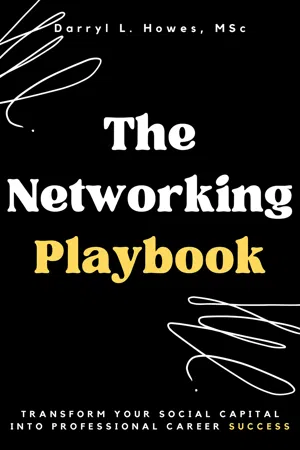![]()
CHAPTER 1
What Is a Playbook? (The Playbook Play)
“The Coach”
Definition: Playbook /ˈplebʊk/ {noun}—North American, meaning “a book containing a sports team’s strategies and plays, especially in American football.” A networking playbook contains all the pieces and parts that make up your go-to approach for getting things done and achieving your networking objectives. It includes your own personal “process workflows, standard operating procedures and cultural values that shape a consistent response—the play.”
Image © 2021 Daniel Byron
I have been thinking about writing a book for the last five years. It’s probably partly the age thing and the thoughts one has as time ticks by on a life.
Another motivation is to try to play a very small part in leveling up society. I believe that opportunity should be available to the brightest and best, whatever their background or ethnicity. Networking is a huge part of social advancement. I’m no social commentator, but there’s a lot that could be done to combat the many forms of unwarranted privilege that exist in our societies.
I also think I have something to offer. Not through blind bravado, but because I have been there and done it (or my version of whatever “it” is).
This is a book about people networking. But unlike some others, it will be a combination of what to do and, crucially, the why.
The why will cover why the book’s suggestions (the “plays”) actually work in practice. What effect will they have on the reader and others? What basis do they have in verified research around the social sciences? The book’s subject matter will draw upon psychology, sociology, and anthropology—but will match this against in-the-field commercial experience, debunking myths as it goes along.
The why will also provide interesting and insightful answers and provide a route map for individuals to decide on their own networking strategies.
I can’t direct people on exactly what to do. They generally do as they please. But I can teach basic principles allowing them to work out and then employ their own Playbook. This is an important lesson around both motivation and memory—we learn and internalize better when something has semantic value; that is, when it is unique to ourselves in its meaning.
As a post-COVID world seeks to reconnect at a face-to-face level, this will be a useful book with wide appeal.
I also want to say a little about “Values.”
People often ask me, “How can I prepare to become a (better) networker?”
This is both simple and complex, because my answer generally involves a suggestion that the person try to think about their personal values.
Now values are funny things. Some we seem to inherit from our caregivers, others just grow within us based on experience. Most people articulate them as “What I believe in” or “The way I live” or “What I consider to be important.”
One of my mentors, Charles Fowler, Chair of the Human Values Foundation based in the United Kingdom, makes a very good point. People can often quite easily say what they think their values are. But they can have extreme difficulty in acting upon them, or “living” them consistently.
This isn’t a criticism of people. Something we all have to grapple with, having first become clear on what our values are, is how we put them into action.
And this rises above what might be called superficial thinking around eating well, exercising, getting enough sleep, and so on. These things are comparatively easy when it comes to addressing the really difficult things that the messiness of life throws at us: bereavement, divorce, or even dealing with teenage offspring!
So, if you and I want to get better at people networking, we could do a whole lot worse than to consider our values. Why? Because they will serve as a litmus test for how we behave toward people and how they behave toward us.
And networking life gets a whole lot easier, if we can talk about our values clearly and concisely and then find others who share them.
So, I’ve said it. That’s my best advice for you right here, right now: Think and act values.
I also want to give an early callout to gender. For too long, male activity alone has been the focus of so-called “real” networking, whether that be at the golf club, frat house, or masonic lodge. Recent years have thankfully seen this view change and society has witnessed a proliferation of female networking groups—some women only, some mixed gender.
To be clear, although there appear to be some differences in the way that women and men network (see, e.g., Yang et al. 2019), there is no definitive research, which infers that one gender is better than the other. So, if you are a woman reading this, all the suggested tools and techniques in this book apply to you in exactly the same way as they would anyone else.
I’d go further in expressing a personal view that, in my experience, women can make better networkers than men. I’ve reached this conclusion over many years, and my ideas rest on the tendency of most women to listen better when in a networking context and act in a more collegiate, noncompetitive, and generous way.
For me, women have no problem in playing the long game when networking and are more likely to focus on personal aspects of a relationship in the first instance and build the commercial aspects from there.
So there, please do carry on reading whoever you are!
I have used “I” language in some of the previous paragraphs. I’m sorry.
We will now use “we” language from now on. This is a good point to clarify, because it’s a networking journey that we embark on together.
What’s Important (The Importance Play/the Importance of Play)
Career Management …
The job market has changed. A combination of technology and rapid organizational development has jettisoned the past and made predicting future trends almost impossible. Many experts now even question the concept of a career.
Some articulate the recruitment shift as one from push to pull. Rather than a job-seeker applying for a role in the traditional way, companies are on the lookout for talent and are adept at making the first approach. And social media is one of the key tools for this.
In addition, traditional talent management programs incur high recruitment costs. The uncertainties of some assessment and selection processes mean that a large proportion of vacancies arise through the unadvertised job market.
These roles are never actively promoted. They tend to come about through immediate need for a talent solution and the knowledge that someone knows someone else who is a good fit for the vacancy.
Hence these opportunities are accessed via who we know (and who knows us, and what we do). This trend partly explains the growth of employee referral schemes, where existing employees are encouraged to introduce new people to the business.
It’s the same for the growing army of self-employed, who need to look after their own career management as much as anyone, whether a contractor, freelancer, or solo-preneur.
Career rewards are good for the top people, but it’s a VERY competitive market. Never has it been more important to find a way to stand out from the crowd. In the words of career specialist, John Lees, (and if self-promotion sounds unpleasant to you), it’s about self-projection.
Networking …
Self-projection involves getting ourselves out there. We can’t network from the shed in the yard!
As humans, we are essentially social animals. Our development across time has hinged principally upon our ability to live and function in the company of others.
Of course, there are many shades to this. But just as there are many different types of people and personality, there are many different forms of networking and networker. Yes, there are a few people who are born networkers—but many more who recognize networking for what it is; a learnable skill that can develop and improve over time.
The Theme That Links the Two …
Success takes teamwork. No one can do it on their own. All successful people rely on a network of mentors, advisers, and confidantes.
Nurturing key relationships that can facilitate career and personal development is what all successful people do. And they build and refer to this network continually and consistently.
Interacting with new people is important. We never know who we might meet and the effect they may have on our professional life and career.
When it comes to building a relationship with a former POTUS, Richard Branson’s Necker Island property isn’t just a holiday retreat …
Image © 2021 Daniel Byron
Should We Play at Networking?
The title to this section mentions “play?”
Yes, that’s because we should try to have fun when we network. Otherwise, what’s the point? And we are not talking play at it, we are talking play with it.
It may not feel much like play at first. For some, it may feel more like torture!
But every networking guru under the sun confirms that, after a bit of practice, we’ll all warm to it.
Don’t treat it like a game. That implies competition.
Treat it like life. And learn to love it!
Are we about to experience a “New-Age of Enlightenment?”
Hi there.
I’m your guide and mentor to help you navigate this book.
This section is the first of what I’m calling an Information Box. You’ll spot them here and there throughout the book.
They are intended to be of interest if you’d like to read further into a topic or find out more. They are also designed to help you think. And, as with most things including people networking, thinking is good.
Sometimes the heading at the top of the box will provide a clue to the content. Sometimes it won’t. Sometimes it will just sound weird!
At the time of writing, the COVID pandemic is still waging its war across the globe. Some lucky people in the Western world c...


